Home
> Chords
>
Funk
There's a definite bluesy/jazzy feel to the chords used in funk music, since that's where its stylistic origins lie. However, certain chord shapes help enhance those syncopated, groove-laiden rhythms heard in funk, which you'll discover when you go on to learn funk rhythm/picking.
So, first we'll look at some essential funk guitar chords to build up our vocabulary, then we'll move on to things like chord phrasing and harmonising. Enjoy it!
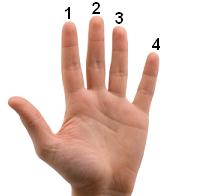
First, we're going to look at the common barre chord shapes used in funk. Make sure you're comfortable with barre chords before we move on as these are used all the time in funk!
There are two main barre shapes/forms used in funk - E and A. E form chords are rooted on the low E string, whereas A shape chords are rooted on the A string.
Rather than just use the basic major/minor barre chords, we're going to use 7th and extended voicings to add more of a jazzy/funky flavour - you'll hear it immediately when you play or hear them (click the diagrams to hear examples).
All the audio examples are played in the key of D, but remember these are movable shapes, so they keep their formation when you move up and down the fretboard with them!
Try the above chords over the backing track below. It's in the key of D, just like the audio examples, so that means the low E string root of these chords will be positioned at fret 10.
Download the backing track
Built around A form barre chords with an A string bass/root, you can get some really nice, classic funk tones with these positions. Again, they're movable shapes, but I'm playing in the key of E in the audio examples (that's fret 7 on the A string).
Try the above chords over the backing track below. It's in the key of E, just like the audio examples, so that means the A string root of these chords will be positioned at the 7th fret.
Download the backing track
Now rooted on the A string...
Bloody hell that's a lot of chords, and by no means the limit!
In the lessons linked to below, you can learn how to cut down these fuller barre shapes for more efficient fingering, allowing us to create intricate chord phrasings to complement those jumpy funk rhythms.
As always, experiment, for example by adding and removing fingers/notes from those basic barre chord shapes. There are tons of chord voicings to discover just from these core shapes.
Main Guitar Chords Section
Funk Guitar Chords
In this lesson we'll be looking at some of the staple guitar chords used in funk, from basic barre shapes to more efficient, "cut-down" chord voicings on the higher strings of the guitar. Free chord
cheat sheet Free chord
cheat sheetLearn how guitar chords work together in any key... Click here to start now |
There's a definite bluesy/jazzy feel to the chords used in funk music, since that's where its stylistic origins lie. However, certain chord shapes help enhance those syncopated, groove-laiden rhythms heard in funk, which you'll discover when you go on to learn funk rhythm/picking.
So, first we'll look at some essential funk guitar chords to build up our vocabulary, then we'll move on to things like chord phrasing and harmonising. Enjoy it!
Essential funk guitar chords
Funk uses some very interesting chord voicings and, similar to jazz, most are built from a 7th chord base, often extended from that to 9th and 13th chords. Don't worry if you don't know what that means, the important thing is you experiment with adding notes to the basic chord shapes you learn as a beginner, to really "big them up" for that funk sound.
First, we're going to look at the common barre chord shapes used in funk. Make sure you're comfortable with barre chords before we move on as these are used all the time in funk!
There are two main barre shapes/forms used in funk - E and A. E form chords are rooted on the low E string, whereas A shape chords are rooted on the A string.
Rather than just use the basic major/minor barre chords, we're going to use 7th and extended voicings to add more of a jazzy/funky flavour - you'll hear it immediately when you play or hear them (click the diagrams to hear examples).
All the audio examples are played in the key of D, but remember these are movable shapes, so they keep their formation when you move up and down the fretboard with them!
Major E form funk guitar chords
Dominant
7th (e.g. D7)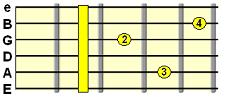 |
Added
6th (e.g. D7add6)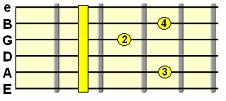 |
13th
(e.g. D13)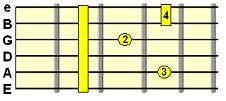 |
Sharp
9th (e.g. D7#9) |
Minor E form funk chords
Minor
7th (e.g. Dm7)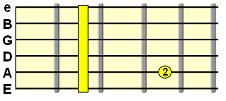 |
Alternative Minor 7th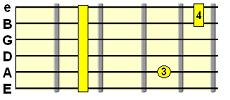 |
Added 6th (e.g. Dm7add6)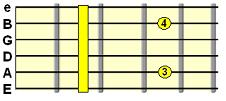 |
Minor
13th (e.g. Dm13)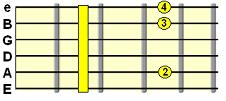 |
Minor
9th (e.g. Dm9)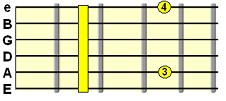 |
Suspended E form funk chord
Suspended
13th (e.g. Dsus13) |
Try the above chords over the backing track below. It's in the key of D, just like the audio examples, so that means the low E string root of these chords will be positioned at fret 10.
Download the backing track
Built around A form barre chords with an A string bass/root, you can get some really nice, classic funk tones with these positions. Again, they're movable shapes, but I'm playing in the key of E in the audio examples (that's fret 7 on the A string).
Major A form funk guitar chords
Dominant
7th (e.g. E7)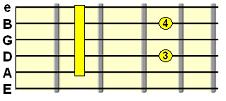 |
Alternative
Dominant 7th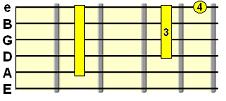 |
Added
6th (e.g. E7add6)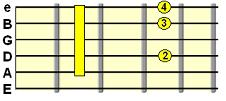 |
Added
6th without 7th (e.g. Eadd6)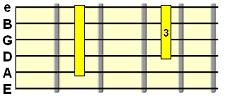 |
Minor A form funk chords
Minor
7th (e.g Em7)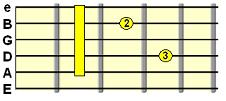 |
Alternative
Minor 7th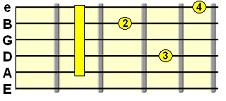 |
Added
6th (e.g. Em7add6)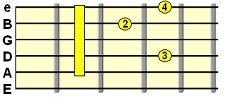 |
Suspended A form chords
Sus
4th Added 6th
(e.g.
E7sus4add6)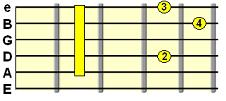 |
Suspended
2nd (e.g.
E7sus2)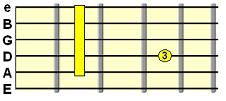 |
9th
Suspended 4th (e.g. E9sus4) |
Sus
2nd Added 6th (e.g.
E7sus2add6) |
Suspended
13th (e.g. Esus13) |
Try the above chords over the backing track below. It's in the key of E, just like the audio examples, so that means the A string root of these chords will be positioned at the 7th fret.
Download the backing track
Other movable funk chord shapes
So already we have a rather large library of funk chords to play with. But there's more! Aside from the common E and A shape barre chords, there's some other nice sounding shapes, rooted on those low E and A strings, that descend rather than ascend from their root note positions. Take a look (and listen), starting with chords rooted on the E string...13th
(e.g. D13)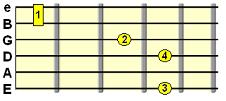 |
9th
Suspended 4th (e.g. D9sus4)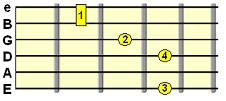 |
Added
9th (e.g. D7add9)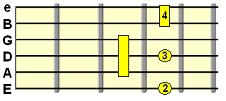 |
Suspended
2nd (e.g. D7sus2)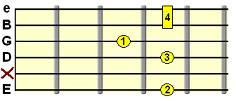 |
Added
6th/9th (e.g. Dadd6/9)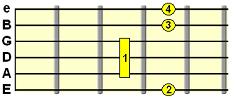 |
Now rooted on the A string...
Dominant
7th (e.g. E7)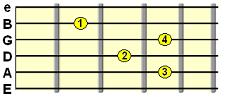 |
9th
(e.g. E9)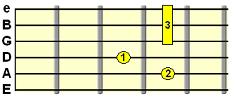 |
Major
9th (e.g. Emaj9)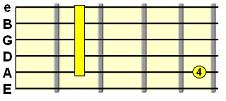 |
13th
(e.g. E13)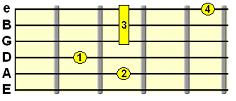 |
Sharp
9th (e.g. E7#9)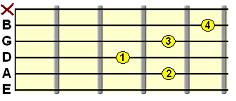 |
Added
6th/9th (e.g. Eadd6/9)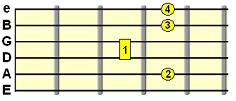 |
Minor
9th (e.g. Em9)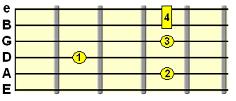 |
Bloody hell that's a lot of chords, and by no means the limit!
In the lessons linked to below, you can learn how to cut down these fuller barre shapes for more efficient fingering, allowing us to create intricate chord phrasings to complement those jumpy funk rhythms.
As always, experiment, for example by adding and removing fingers/notes from those basic barre chord shapes. There are tons of chord voicings to discover just from these core shapes.
| |
Tweet |
Stay updated and learn more
Sign up to the newsletter for updates and grab your free Uncommon Chords book
Sign up to the newsletter for updates and grab your free Uncommon Chords book
Movable Guitar Chords
Main Guitar Chords Section








